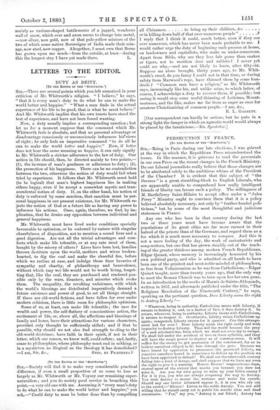LETTERS TO THE EDITOR.
DUTY AS DEITY.
[To THE EDITOR OF THE SPECTATOR.1
Sfa,—There are several points which you left unnoticed in your criticism of Mr. Whitworth's religion. " I believe," he says, "that it is every man's duty to do what he can to make the world better and happier." "What a man finds in the actual experience of his life to be good, that is what he must believe." And Mr. Whitworth impliei that his own tenets have stood the test of experience, and have not been found wanting.
Now, a duty usually implies a corresponding sanction ; but let us for a moment suppose that the command which Mr. Whitworth feels is absolute, and that no personal advantage or disadvantage consciously or unconsciously influences his*views a right ; he only feels an imperative command "to do all he can to make the world better and happier." Now, if better does not bear the same meaning as happier, it can only signify to Mr. Whitworth a stricter adherence to the law of duty. Our action in life should, then, be directed mainly to two points,— (1), the increase of man's goodness or adherence to duty ; (2), the promotion of his happiness. There can be no contradiction between the two, otherwise the notion of duty would fail when tried by experience. It follows that Mr. Whitworth must hold (to be logical) that man's highest happiness lies in making others happy, even if he accept a somewhat mystic and tran- scendental notion of duty. If, on the other hand, his notion of duty is enforced by some sanction, that sanction must be per- sonal happiness in our present existence, for Mr. Whitworth re- jects the notion of God or a future life as having any power to influence his actions. Once, again, therefore, we find, by im- plication, that he denies any opposition between individual and general happiness.
Mr. Whitworth must have lived under conditions specially favourable to optimism, or be endowed by nature with singular cheerfulness of disposition, not to mention a sound liver and a good digestion. Are not all the trivial advantages and com- forts which make life tolerable, or at any rate most of them, bought by the misery of others ? Lives have been lost, families thrown destitute upon the world, mothers and wives broken- hearted, to dig the coal and make the cheerful fire, before which we recline at ease, and indulge those finer luxuries of sympathy and charity, of philanthropy and benevolence, without which (say we) life would not be worth living, forget- ting that, like the coal, they are purchased and rendered pos- sible only by the wars, disasters, and miseries which evoke them. The inequality, the revolting unfairness, with which the world's blessings are distributed imperatively demand a future existence and power of good, to set all things straight. If these are old-world fictions, and have fallen for ever under modern criticism, there is little room for philosophic optimism.
Some of us, at least, can make life tolerable ; the race for wealth and power, the self-flattery of conscientious action, the excitement of life, or, above all, the affections and blessings of family and home, have their attractions for various characters, provided only thought be sufficiently stifled ; and if that be possible, why should we not also find strength to cling to the old-world doctrines ; have faith in their spirit, if not in their letter, which our reason, we know well, could refute ; and, lastly, cease to philosophise, where philosophy must end in nothing, or in a mysticism as illogical as the theology it has demolished ?


































 Previous page
Previous page